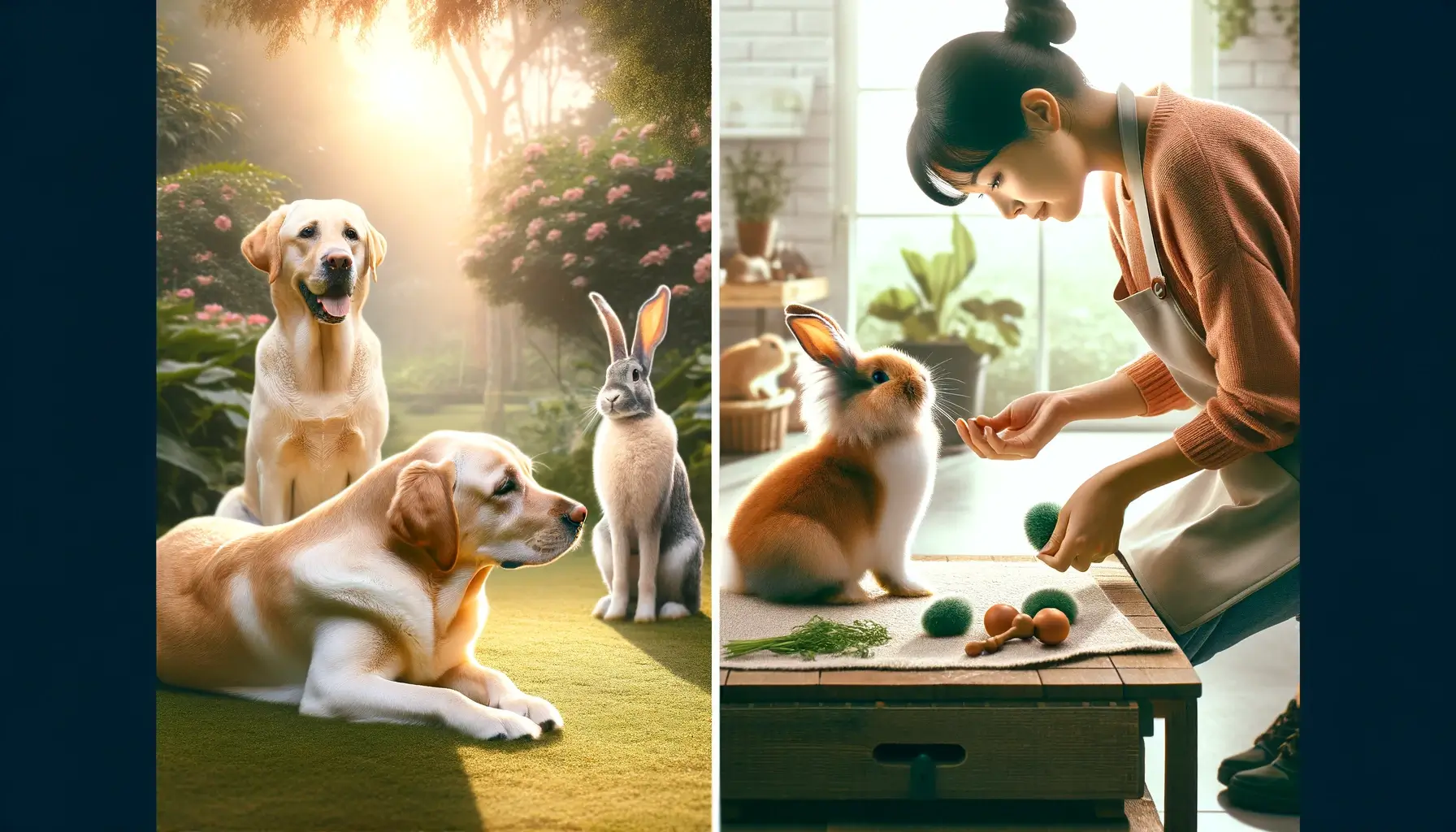Key Takeaways
- Labrador Retrievers, Golden Retrievers, Poodles, Cavalier King Charles Spaniels tend to do well with rabbits due to their gentle, trainable temperaments.
- Look for breeds with lower prey drive, tolerance, trainability, and friendliness towards other pets.
- Proper, gradual introductions and continued supervision are essential for success.
- Some dogs may never fully overcome high prey drive instincts around rabbits.
- Ensure rabbits have their own secure housing/play areas, well away from the dog.
- Never leave dogs and rabbits together unsupervised, even if they seem to get along.
Breeds Often Good with Rabbits
Certain breeds tend to fare better than others when socialized with rabbits:
| Breed | Reasons |
|---|---|
| Labrador Retriever | Eager to please owners, highly trainable, family-friendly. |
| Golden Retriever | Intelligent, biddable, gentle nature. |
| Standard Poodle | Quick learners, adaptable, enjoy training. |
| Cavalier King Charles Spaniel | Affectionate, gentle, typically tolerant of other pets. |
| English Bulldog | Calm, low energy, fond of lazing around. |
| Pugs | Quiet, gentle, enjoy napping and cuddling. |
In general, breeds originally developed as mellow companion dogs rather than hunters tend to more readily coexist with rabbits. Their genetic drive to chase small animals is not as strong. However, as prey animals, rabbits may never feel fully comfortable around canine companions. Proper management is always necessary.
While the above breeds can make good rabbit companions, individual differences in temperament matter most. Some Labrador Retrievers may be too energetic and playful for a nervous rabbit’s comfort, while certain territorial Poodles may not tolerate other pets. Meet the individual dog or puppy before deciding. Shelters can help match you with a sweet-natured dog known to do well with other animals.

Characteristics of Rabbit-Friendly Dogs
Ideal traits to look for in a dog likely to peacefully cohabitate with rabbits include:
- Low Prey Drive – This innate instinct to hunt small fleeing animals varies between breeds and individuals. Dogs with less intensity around rabbits and a solid “leave it” command are best.
- Trainability – The ability to reinforce gentle, positive behavior while extinguishing rough, aggressive play or chasing is key. Pups who aim to please their owners excel here.
- Gentleness – A soft mouth, tolerant attitude, and inhibition against using teeth during play helps minimize injuries.
- Friendliness Towards Other Species – Some dogs are simply more interested in befriending all animals peacefully.
- Calm, Low Reactivity – High energy dogs prone to sudden movements may scare rabbits. Mellow pups are less intimidating.
While certain inherent traits contribute to harmony with rabbits, nurture trumps nature when it comes to animal behavior. Even dogs bred to hunt rodents for centuries can potentially learn peaceful coexistence when carefully trained and managed. But high prey drive remains an obstacle for some.
Benefits of Having a Dog That Gets Along with Rabbits
Harmonious dogs and rabbits impart benefits like:
- Reduced Stress – No worries about fights breaking out if left together a short time.
- Enriching Play – Both species enjoy gentle play with appropriate dog toys. Teach the dog to “bow” and offer toys to initiate play.
- Socialization – Rabbits are very social animals and often benefit from a friendly canine companion.
- More Freedom – The home doesn’t need to be rigorously rabbit vs. dog zone. Some co-mingling can be allowed with supervision.
- No Aggression – Lack of chasing prevents trauma and potential injuries or medical issues. Fearful body language and hiding diminishes.
While 100% trust should never exist between predator and prey species, friendlier dogs bring less accidents and anxiety for all. But owners must continually invest time into positive reinforcement training and carefully manage all interactions.
Introduction and Training Methods
Proper introductions and training lay the groundwork for success:
- Gradual Introduction – Let the pets sniff each other through a barrier first. Very slowly work up to brief, positive interactions with lots of rewards.
- Provide Toys/Treats – Use favorite objects to motivate and distract whenever in presence of the other species. This builds positive associations.
- Abundant Praise for Calm Behavior – Frequently reward the dog for ignoring the rabbit and responding to commands. Use high value treats only broken out for rabbit socialization.
- Prompt Correction – Quickly interrupt any signs of prey drive or aggression using training tools like Pet Corrector spray. Then redirect to a “sit” or “watch me” using praise and treats.
- Limit Chasing Opportunities – Dogs instinctively want to chase fleeing animals. Carefully structure activities to prevent triggering chase drive.
- Retreats for Each Pet – Ensure rabbits always have safe enclosures and play areas well away from the dog’s reach. This provides peace of mind.
For already chase-prone dogs, professional guidance can introduce necessary tools like basket muzzles, head collars, or remote correction. All interactions should remain fully supervised – things can change quickly.
What If It’s Not Working?
Prey drive can be impossible to fully override in some dogs. Signs a dog is not adaptable to rabbits include:
- Persistent chasing, lunging, or violence despite ongoing training
- High arousal at the sight/smell of the rabbit
- Biting or injuring the rabbit
- Blocking or troubling a caged rabbit
If aggressive urges remain unchecked after professional training intervention, the only safe approach is total separation at all times via confinement, leashing, or rehoming. Some dogs simply cannot reside peacefully with rabbits due to deeply ingrained prey drive triggers. Nothing should compromise the rabbit’s safety and wellbeing.
Conclusion
Certain gentle, trainable dog breeds like Labrador Retrievers or Poodles tend to thrive when socialized with rabbits, while hunting breeds often struggle. But proper introductions, training, enrichment, and supervision determine compatibility above all else. Ensure rabbits have secure housing, then allow only controlled interactions while directly monitoring body language. With wise precautions, many canines and rabbits settle into safe, enriching bonds. But some dogs simply lack the prey drive control to ever be left unsupervised around a tantalizing bunny, requiring vigilant oversight.
Frequently Asked Questions
Q: What are the best dog breeds for living with rabbits?
A: Labrador Retrievers, Golden Retrievers, Standard Poodles, Cavalier King Charles Spaniels are typically gentle and trainable enough to peacefully coexist and interact with rabbits.
Q: How can I train my dog to be gentle with my rabbit?
A: Use positive reinforcement to reward calmness around the rabbit. Provide toys to initiate gentle play. Correct chasing immediately. Limit interactions initially.
Q: What if my dog has a high prey drive?
A: Dogs with very high prey drives may never be trustworthy alone with prey-animal housemates like rabbits. Carefully manage interactions and provide separate living spaces.
Q: Can any dog breed be trained to live with rabbits?
A: Proper socialization and training from a young age can help many dogs safely coexist with rabbits. But high prey drive may still make some breeds unreliable.
Q: What if my rabbit and dog don’t get along?
A: If aggressive chasing/lunging persists despite training attempts, do not leave them unsupervised together. Ensure separated housing. Rehoming one pet may need to be considered.
Hi, I’m John and I love dogs. Ever since I was a kid, I always wanted to have a furry friend by my side. I grew up with a golden retriever named Max, who taught me a lot about loyalty, friendship, and fun. He was my best buddy for 12 years, and I miss him every day.
